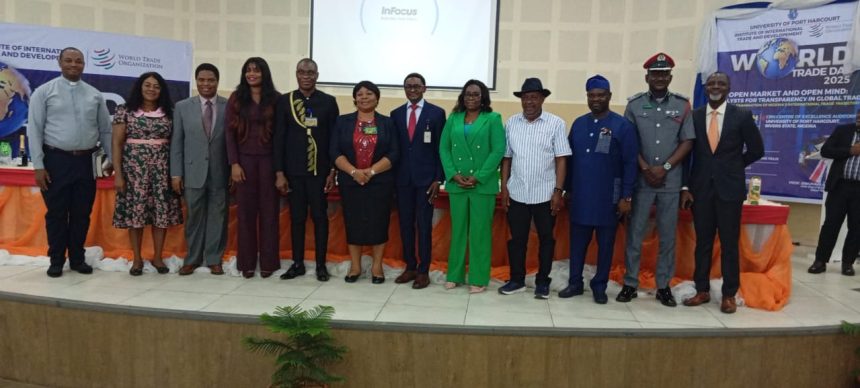- Trade among African nations grew by 14-9% in 2023
Ben Eguzozie, in Port Harcourt
Chinyere Nwoga, president of the Port Harcourt Chamber of Commerce and Industry (PHCCIMA) says African nations must prioritise intra-African trade and collaboration to stimulate the continent’s $1.4bn GDP economy, and development. She stresses that a pragmatic African blueprint like the AfCFTA can boost intra-continental trade, and engender economic liberation.
Nwoga, who chaired a special event to mark the 2025 World Trade Day, organized by the Institute of Internal Trade and Development, University of Port Harcourt, themed: “Open Market and Open Mind: Catalyst for Transparency in Global Trade,” said Africa must look within to its people, its resources, its entrepreneurs and its institutions if it hopes to remove the internal trade barriers that have stagnated progress, costing the continent billions each year.
Trade among African nations is yet to rise to an appreciable level. Many national customs tariffs, police checks and other encumbrances combine to hinder vast continent-wide trade growth. The most recent data from the African Export-Import Bank’s (Afreximbank) African Trade Report 2024, indicates that intra-African trade accounted for 14.9 percent of total African trade in 2023. This represents a marginal increase from 13.6 percent recorded in 2022. Intra-African trade also showed a meagre uptick by 3.2 percent in 2023, compared to 10.9 percent growth seen in 2022, according to Afreximbank.
In addition, the Brookings Institution said the United Nations Economic Commission for Africa (UNECA) projects a 35 percent increase in intra-African trade by 2045, following the full implementation of the African Continental Free Trade Area (AfCFTA).
Nwoga said Africa must rise, look inward, step outside their comfort zone, and rely on themselves to drive self-sufficiency. To achieve this, infrastructure must be improved, corruption fought headlong, and local industries empowered to compete and collaborate beyond borders.
She noted that the African private sector is ready. “What’s needed now is bold political will. As a leader of the organized private sector in River State, PHCCIMA advocates for global trade, as well as continental trade. Africa must begin to post-trade among its nations, and fast-track the objectives of eliminating tariffs on 90% of goods over time to enhance the creation of a single African market,” she added.
According to the PHCCIMA boss, these are achievable with an enabling environment. “All we need is to look at the customs procedure, the vast climate, and military issues, and start harmonizing policies including cultural and bureaucracy issues while engaging in capacity building”.
The chamber is an essential business organization, with key objectives of encouraging entrepreneurship, and training of young minds especially in higher institutions, pursuing collaborations and partnerships with other institutions to drive business.
PHCCIMA, according to the president, is the oldest and second-largest city chamber in Nigeria after the Lagos Chamber of Commerce and Industry (LCCI). It is one of the only three premium chambers of commerce in Nigeria, she explained.
Iroghama Ogbeifun, the MD/CEO of Starzs Group of companies was the keynote speaker. The director-general of Yenagoa Chamber of Commerce and Industry (YCCIMA), Warmate Jones Idikio, among others were resource persons. Each of them reechoed the need for African nations to ramp up intra-African trade and collaboration to drive development and prosperity across the continent.










